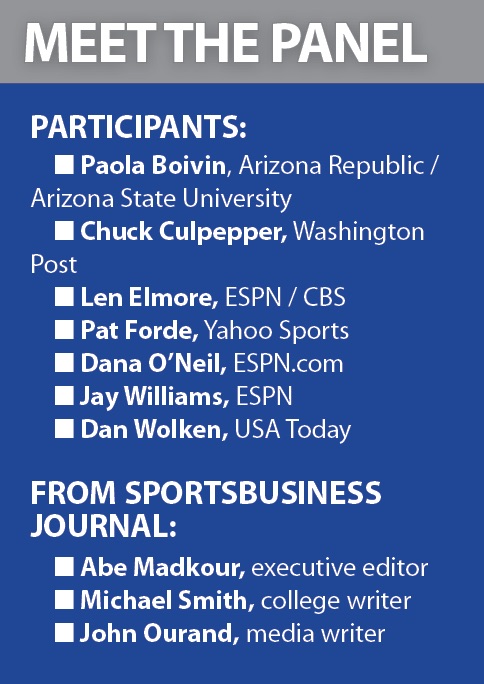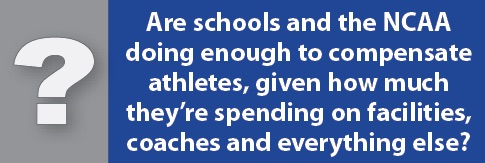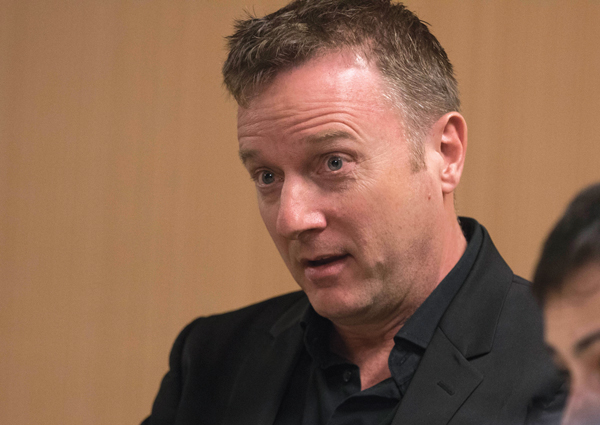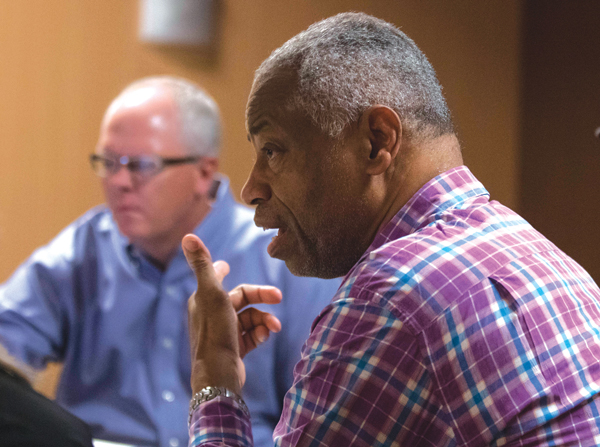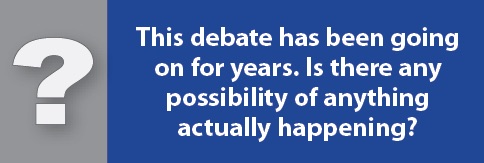Editor’s note: This is part two of our sports media roundtable from the Final Four. For part one in our previous issue, click here.
Seven of the most respected authorities on intercollegiate athletics gathered in Phoenix during the Final Four to form SportsBusiness Journal’s first sports media roundtable. They came from TV, digital and print. Some used to play the game. Some have been covering the games and all the trappings of college sports for 30 years or more.
What they all have in common is that they have a passion for the future of the enterprise, which came through loud and clear during the 90-minute roundtable discussion. In this two-part series, the topics range from athlete compensation and LaVar Ball, to the NCAA’s investigation of national champion North Carolina and the coach and athletic director you’d want if you were starting a program.
We finish with Part 2 in this edition, following Part 1 in the April 10 issue.
Podcast highlights from the discussion:
■ JAY WILLIAMS: You guys are lucky my partner (Jay Bilas) isn’t here. (laughs)
■ LEN ELMORE: The first question is the terminology compensate. To me, this is not an employer-employee relationship. It’s benefactor-beneficiary. The last time I checked, there was no right to play college sports. Essentially, it’s a privilege and it’s done by contract. Do we need to balance the equities from an optics standpoint? Absolutely. But when you start looking at things like cost of attendance, room, board and other things that are honestly taxable — the IRS just turns its head. And there should be more. I’m a big believer that there’s no right to play, but you still have your natural rights, and rights to name and likeness is one of them. If you’re going to use an athlete’s likeness to promote a sport, you need to compensate for it. But beyond that, salaries, pay-for-play, I think would obscure the educational mission and ultimately be a distraction for them.
■ WILLIAMS: Isn’t there a way that a portion of the revenue that program generates can be put in escrow so the athletes could capitalize on that at the end of their eligibility?
■ ELMORE: I’m trying to understand why, with the free education and all the other stuff …
■ WILLIAMS: But that still pales in comparison with what these programs are making.
■ ELMORE: Quantify room, board, books, tuition, the cost to practice every day in a world-class facility being taught by world-class teachers, as much food as you can eat …
■ DANA O’NEIL: Nutritionists.
■ ELMORE: All of the medical benefits. All over a four-year period. And what you, as an athlete, have to do is give your best on the court and in the classroom.
■ WILLIAMS: Twenty years ago, I would have said OK. But the money is so ridiculous at this point. Len, I hear what you’re saying and I agree on a lot of it. …
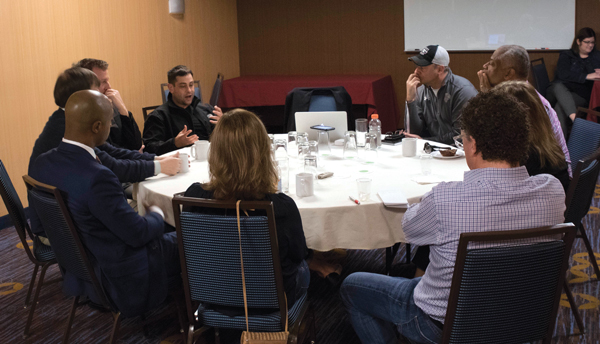 |
The panel addressed issues facing college sports for 90 minutes. Below at right: Washington Post writer Chuck Culpepper; At bottom: SBJ’s Michael Smith listens to Len Elmore.
Photos by: DARRYL WEBB
|
■ ELMORE: I know what you’re going to say. I know what you’re going to say. Look at how much coaches are getting paid. But we also need an antitrust exemption so we can rein in spending on facilities, so we can control coaches’ salaries. I don’t begrudge anyone getting paid, but we’re at a point now where the optics are out of whack.
■ PAT FORDE: This makes me a bad columnist, but I see both sides to this. I was firmly in your camp, Len, for a long
time until 2010, 2011, when realignment blew everything up just for the sake of making more money. I was like, “Screw it, this is ridiculous.” It’s such a greed grab, how can the players get such a small percentage of it. I’ve got two kids that are student athletes in college right now and a third going next fall. They’re getting a really good deal. They’re swimmers, they’re not generating any money. Programs that do, I have a hard time.
■ ELMORE: Who’s supporting them?
■ FORDE: Football.
■ ELMORE: You start paying players, the money’s got to come from someplace. It’s going to come from the nonrevenue sports. Pay them all and let’s cut tennis, golf and swimming. That’s the world we live in.
■ DAN WOLKEN: I lean more toward Len’s view, but I also think the image and likeness … why is it even a debate. I don’t know why schools would not allow the athletes to capitalize on their marketing power while they’re in college, many of whom will have their maximum marketing power while they’re in college.
■ ELMORE: You’re talking about 1.8 percent in basketball (playing professionally). Maybe 2 percent in football. For the rest of them, when it’s over, it’s over. The right to your likeness is a natural right and nobody should have to abdicate that. If you could find a way to put money in a group licensing pot and distribute it upon graduation, I’m all for that.
■ WOLKEN: I covered the 2008 Memphis team and only one has had a long NBA career, but I guarantee you every one of those kids could have gone out and gotten endorsement deals when they were still in college. That point in time was the high end of their popularity.
■ WOLKEN: There’s far more openness to the name-and-likeness debate now than there’s ever been.
■ ELMORE: The biggest move the NCAA could take is the antitrust exemption, but it’s a political football. Right now, the NCAA is dying a death of a thousand cuts with all of these cases. Settle this, settle that, legal fees. They need to get rid of all that. It’s like the wild west. When Tombstone was in trouble, what did they do? (laughs) They called a strong marshal and gave him all the power to clean it up. That’s what an antitrust exemption would do. Now the games might actually have to be in jeopardy before Congress wants to act, but conceptually that’s the way to go.
■ WILLIAMS: I’ve always wondered if kids would have the moxie or the awareness to boycott the Final Four.
■ ELMORE: Have you looked at the faces of these kids?
■ WILLIAMS: No, I get it, you get lost in the pursuit of a championship.
■ ELMORE: You’re going to tell these kids that you finally get here and “OK, guys, we’re going to boycott.” You’ve got a lot of activists out there who are pushing. I sound like the FBI: “You’ve got these agitators out there.” In a sense, that’s what we have. We’ve got agitators who have no understanding of the feeling to get that far, to play for a championship. And most of the kids, not all, but most would say they were treated well. There’s no way you’d get anybody to boycott that.
■ CHUCK CULPEPPER: That right there, the feeling versus American capitalism. The reason I think it’s been discussed for so many decades is that it’s the hardest issue I can think of in any realm of life that’s so bloody hard to figure out what to do about it. I mean, we’re the weirdest people on earth — 100,000 people go watch students play. It’s grown like it has and now we’ve got all of this money sloshing around. Harbaugh is going to Rome. How do you sort it out? In part of my mind, I think Reggie Bush deserved a house, running around the Coliseum in front of 90,000 people. Get him a house, please.
■ PAOLA BOIVIN: Well, it’s like Pat was saying. In our jobs we want everything to be black and white, but it’s hard to come to a conclusion on this.
■ WOLKEN: It’s this American thing that we all love capitalism unless it comes to sports. When it comes to sports, we like socialism. I’m of the belief that if you threw out the NCAA rulebook and it was the wild west, all of the best basketball players would go to Kentucky, North Carolina, Kansas, Duke. And in football, Alabama, Florida State. The same powers would still be powers. There might be some school that might have an opening for the entrepreneurial spirit to invest in players. Part of me thinks there would be nothing wrong with that, and I don’t think people would turn off the games because of that.
■ ELMORE: What about going to school, what about education? That’s the component we miss when we talk about college sports.
■ O’NEIL: You’re allowed to go to class. People act like they’re not there to go to school, but they can. I know they’re there to go play basketball, but they’re given an opportunity to get an education and better your mind for free. Why not?
■ FORDE: With a ton of academic support.
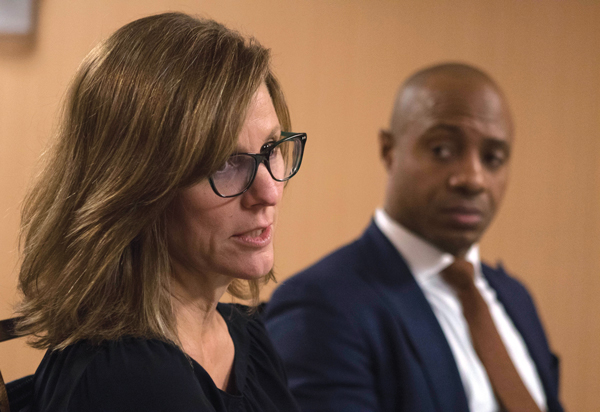 |
ESPN.com’s Dana O’Neil and commentator Jay Williams fall on opposite sides of the college athlete compensation argument.
Photo by: DARRYL WEBB
|
■ O’NEIL: There was this thing in Time magazine a few years ago about Johnny Manziel and it had all the money that the school was making. I wanted to do the opposite and look at all the money the school was putting in with the strength and conditioning coach and the nutritionist and the academic adviser and the facilities and the food. There is an investment on the other side.
■ WILLIAMS: You also see multiple reports about student athletes who wanted to major in certain majors and they’re told not to.
■ ELMORE: See, they need student-athlete advocates.
■ WILLIAMS: I agree 100 percent. What you hear is the curriculum is too difficult, the class load, the schedule doesn’t work out with the travel schedule. I hear countless stories.
■ O’NEIL: That’s disgusting.
■ ELMORE: You know, we sit there talking about exploitation and what burns me is when a Ben Simmons comes out and says, “The NCAA is whack.” He didn’t want to go to class second semester. “But I have to go to class and the NCAA is exploiting me.” Are you kidding me? You’re from Australia first of all. Go to the D-League and play against better competition. Or go to Europe and play against better competition. No, you chose to go to LSU because it would build your brand. That’s where I hear LaVar Ball and all these other guys talking about: “They’re exploiting my son.” If you’re so involved, you shouldn’t let the exploitation happen. You shouldn’t exploit the situation, either. … The one-and-dones and the two-and-dones are the ones exploiting the system as much as the system is exploiting them.
■ FORDE: We’ve got two all-time great basketball players (on this panel) who have gone on to do great things besides playing basketball. If you didn’t take advantage of your education, like a lot of these guys don’t …
■ ELMORE: That’s because we keep talking about the money. The money will solve everything, just ask Antoine Walker.


